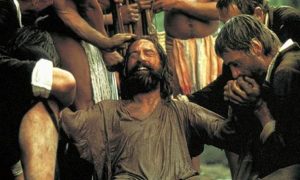Written by Robert Bolt, Cinematography by Chris Menges, Music by Ennio Morricone, Starring Jeremy Irons, Robert De Niro, and Ray McAnally. 125 mins. Rated PG.
There, finally, at the top of the spectacular Iguaza Falls, after days of treacherous, barefoot climbing up and up water-slick sides of rock and mud, arrives Rodrigo Mendoza (Robert De Niro), a mercenary filled with guilt and grief, a fratricide and a ravenous marauder of booty and people (36:19-36:48). His days-long ascent up the side of the Falls results from a penitential challenge proffered by Jesuit Father Gabriel (Jeremy Irons), a man no less fierce in love than Mendoza is in enmity. The volatile Mendoza has killed his own brother in a fight over a woman, the one Mendoza thought was his mistress. Afterward, devoured by guilt, Mendoza has consigned himself to a monk’s cell for a slow death by self-starvation (31:45). And then that priest shows up, aptly named Gabriel, who mocks Mendoza’s spiritual timidity. Do the penance that’s due, says Gabriel, an extreme measure of suffering and fear that will assuage his devouring guilt. In short, after days of contest, Mendoza wins, hauling himself and his heavy bag of armor, amply symbolic of the great violence of his life, reaching the top of the Falls, exhausted but defiant still.
Only then, indeed, the Incredible happens, an unimaginable event that amply disproves Gabriel’s calculus of redemption by penitential suffering, at least in this case. Incredibly, stunningly, wordlessly, love happens, love both mysterious and consuming, and it takes Mendoza, of all people, by storm—as with a cyclone. And it is so also for the viewer, like in “Huh? Just what exactly just happened here, anyway?” And it is all the more so because it is wordless, all ignited by an utterly unforeseeable gesture that skins every soul alive. At the top of the Falls live the Guarani, a native tribal group whose property and people Mendoza and his cut-throat mercenaries have raided for years. Mendoza makes his living abducting and selling people, “human trafficking,” in twenty-first century language. Among the Guarani, Mendoza is both infamous and dreaded. Only now, incredibly, at the top of the Falls appears a worn, bedraggled Mendoza, not the powerful marauder, but a filthy pilgrim with a bag of armor attached. The first impulse of the Guarani is to execute retributive justice, putting a knife to his throat and finishing him off—until, that is, the Guarani leader gives the word to cut him free of his burden of armor (and guilt) and to welcome him (39:10-42:32).
Mendoza is incredulous, awestruck, and God-struck too, smacked in the soul with what Frederick Buechner called the gift “too good not to be true,” the reality of a capacious divine love even for the likes of Mendoza, and here it arrives in unforeseeable mercy and welcome from the very people with every sensible reason to slay him dead on the spot. The sequence, as the film as a whole, is beautifully shot by cinematographer Chris Menges, and better yet, Ennio Morricone’s exquisitely delicate and exultant music, in one of the best film scores ever written, bathes the event. It is no wonder that The Mission won the grand prize at the Cannes Film Festival, though American critics generally did not quite know what to make of it.
And then the man’s-man soldier cries, and laughs, and cries and laughs still more, as well he should, for he has, against all odds and expectation, run smack into the reality for which the heavens and the earth and people and all creatures were made in the first (and last) place—a love so consuming that it upturns the way the world is, especially as the whole group welcomes their persecutor. Even Paul’s turnabout on the way to Damascus pales. And from there, remarkably, Mendoza lays aside his arms and soldierhood to seek the priesthood and pacifism, refusing to kill even game. He will have had enough of the life of death. Rarely does one see pictured so very fully and splendorously a melding of both spiritual and moral redemption—not just conversion of mind but full-blown redemption of the whole of the soul, a searing remaking of the whole infernal self.
written by Roy Anker

Sign Up for Our Newsletter!
Insights on preaching and sermon ideas, straight to your inbox. Delivered Weekly!

Categorized into Conversion
The Mission (1986)